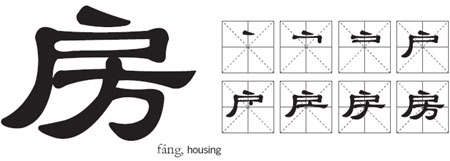Words and weibo favorites of 2013

Netizens were at their inventive best last year and many of their new phrases came into everyday use
Each year has its keywords and phrases. In 2009, the global phrase was financial crisis; in 2010, a keyword in China was 涨 (zhǎng, to rise); in 2012, one hot term in China was Diaoyu Islands (whose Chinese ownership Japan disputes)... What are the words of 2013? The National Language Resource Monitoring and Research Center, Commercial Press, Chinese Central Television and Shandong Satellite TV announced the official Chinese words of last year.
The Character of 2013 in China:
房 (fáng)
房, which means housing, was chosen as the Chinese Character of the Year. Housing has special significance for Chinese. It is a necessary criteria for many men to have a wife or a girlfriend; it is a criteria for success; and it is a burden for college graduates and low to middle-income earners. Last year, housing in China was said to be the least affordable in the whole world. Despite the banning of group renting (群租 qún zū), many college students and migrant workers still have to rely on cramming into an apartment to make rent affordable. Yet the real estate bubble seems to still be growing ever-larger as 房价 (fángjià) remain stiflingly high. In Nanjing, housing prices have been on the rise for 18 consecutive months. Beijing's real estate prices have increased more than 20 percent after 12 months' of consecutive increases. Young people are weighed down by 首付 (shǒufù, down payments) and 月供 (yuègōng, monthly payments) as soon as they graduate. They face incredible pressure from their parents and society to have a place of their own.
Other top characters included 梦 (mèng, dream), as China realized the dream of sending the Jade Rabbit to the moon and the country is on its way to realize its Chinese Dream
(中国梦 zhōngguó mèng), and 霾 (mái, smog), as the airpocalypse fell on Chinese cities one after the other.
The Word of 2013 in China:
正能量 (zhèng néngliàng)
Literally "positive energy", 正能量 is used to describe anything that gives off a positive influence, promotes positive attitudes or makes others feel better. Used as both an adjective and a verb, this word embodies hopes and wishes to make life happier. In a way, choosing "positive energy" as the Word of the Year broadcasts "positive energy" as well.
Other keywords of 2013 included 女汉子 (nǚ hànzi, manly woman), 土豪 (tǔháo), and 单独二胎 (dāndú èr tāi, the relaxation of one-child policy) among others.
On the global level, 争 (zhēng, fight, dispute) is the international character of the year. In the United States, Republicans and Democrats engaged in frenzied disputes, and eventually the US government had to shut down. Syria, Thailand and other countries also engaged in domestic and global disputes that brought chaos. China and Japan also continued their dispute over the Diaoyu Islands.
The international global word of the year is 曼德拉 (Màndélā, Mandela). The departure of Nelson Mandela shook the world, and the entire globe mourned his death.
Other keywords revolved around the hottest international scandals this year, such as the 斯诺登 (Edward Snowden, Sīnuòdēng) incident, PRISM (棱镜门 Léngjìng mén), and the chemical weapons (化学武器, huàxué wǔqì) allegedly used in Syria. 大妈 (dàmā) (Chinese middle-aged women) also received an honorable mention because of their gold-buying.
Top 5 Chinese Internet phrases of 2013
Show off (晒, to dry out) your knowledge of up-to-date Chinese Internet language with the help of the top 5 Internet phrases that took hold this year. Every year, netizens' collective wisdom contributes to the birth of numerous Internet slang terms, some of the words of the year get to stay, and some die out. Among others, the shouting font (咆哮体) still enjoys immense popularity. Let's take a look at the top 5 phrases of the year.
1. 何弃疗 (hé qì liáo)
何弃疗, or its full version 为何放弃治疗, means "why give up treatment?" The undertone: there's something wrong with you, perhaps you should go see a shrink. As Internet slang however, it is mostly used to satirize or 自黑 (self-mock). If you see pictures of people in weird poses, or even just singing into a hair brush, you can say "wow, friend, 何弃疗?"
For example:
为什么放弃治疗?
Wèishénme fàngqì zhìliáo?
Why give up treatment?
因为鲁迅说过:治病救不了中国人。
Yīnwéi lǔxùn shuōguò: Zhì bìng jiù bùliǎo zhōngguó rén.
As the great writer, Lu Xun, said: "Treating diseases won't save Chinese."
2. 我和我的小伙伴们都惊呆了 (Wǒ hé wǒ de xiǎo huǒbànmen dōu jīng dāi le.)
I and my pals are all dumbfounded, or its short version 我伙呆, can be used in all circumstances to express the feeling of shock, bewilderment, or sarcasm.
For example:
新郎婚礼上宣誓叫出的是初恋的名字!我和我的小伙伴们都惊呆了!
Xīnláng hūnlǐ shàng xuānshì jiào chū de shì chūliàn de míngzì! Wǒ hé wǒ de xiǎo huǒbànmen dōu jīng dāile!
At the wedding, the groom said his first love's name by mistake during the vows! I and my pals were all dumbfounded!
3. 人艰不拆 and Internet chengyu
The four-letter structure, a typical and most identifiable characteristic of chengyu (idioms), made its way into Internet language this year. 人艰不拆 (Life difficult no expose), 累觉不爱 (Tired feel no love), 不明觉厉 (Don't understand, seems awesome) and 十动然拒 (Very moved, then Rejected) have all made it into mainstream Internet vocabularies that are used by netizens every day. These characters are all picked out of a sentence, similar to how acronyms work.
For instance, "Very moved, then rejected" was coined because of a man's tragic story. He spent 2012 composing a love letter of 160,000 words, gave it to his crush on Singles' Day (Nov 11), and confessed his love to her. She was very moved, and then she rejected him.
4. 神最右 (shén zuì yòu)
神最右, which means "godlike commenter on the far right" is a phenomenon that mostly applies to Sina Weibo. The retweet system on weibo follows the format of (your words, eg godlike rightmost!) //@(commenter) (comments). In many cases, the commenter on the far right is the one who has the cleverest comment, and that comment is retweeted weibo-wide, always appearing in a post as the comment on the most right.
5. 土豪 (tǔháo)
土豪, which means "Tacky Rich", "Uncouth Rich", and "Beverly Hills Hillbilly" was adapted into online language and spread into daily language with incredible speed. The color of the gold iPhone 5S is referred to as 土豪金 (tǔháo jīn), tuhao gold, and soon this word became commonly used to describe that color. The phrase 土豪,我们做朋友吧 tǔháo, wǒmen zuò péngyǒu ba (tuhao, let's be friends) also went viral.
Besides the above five, other phrases such as 快到碗里来 (come into my bowl)? 元芳你怎么看 (Yuanfang, what do you think about it?) and 人干事 (short for 这是人干的事吗, is this what a human being would do?) are also popular on the Internet. May different people had their different top 5 in this year.
Courtesy of The World of Chinese, www.theworldofchinese.com
The World of Chinese


(China Daily Africa Weekly 01/31/2014 page27)
Today's Top News
- Visit highlights China's importance
- China fortifies energy security as risks rise
- Taiwan separatists warned of action
- Intl students pledge to be cultural links
- Economy set to extend steady growth trajectory
- Development blueprint offers list of opportunities






























